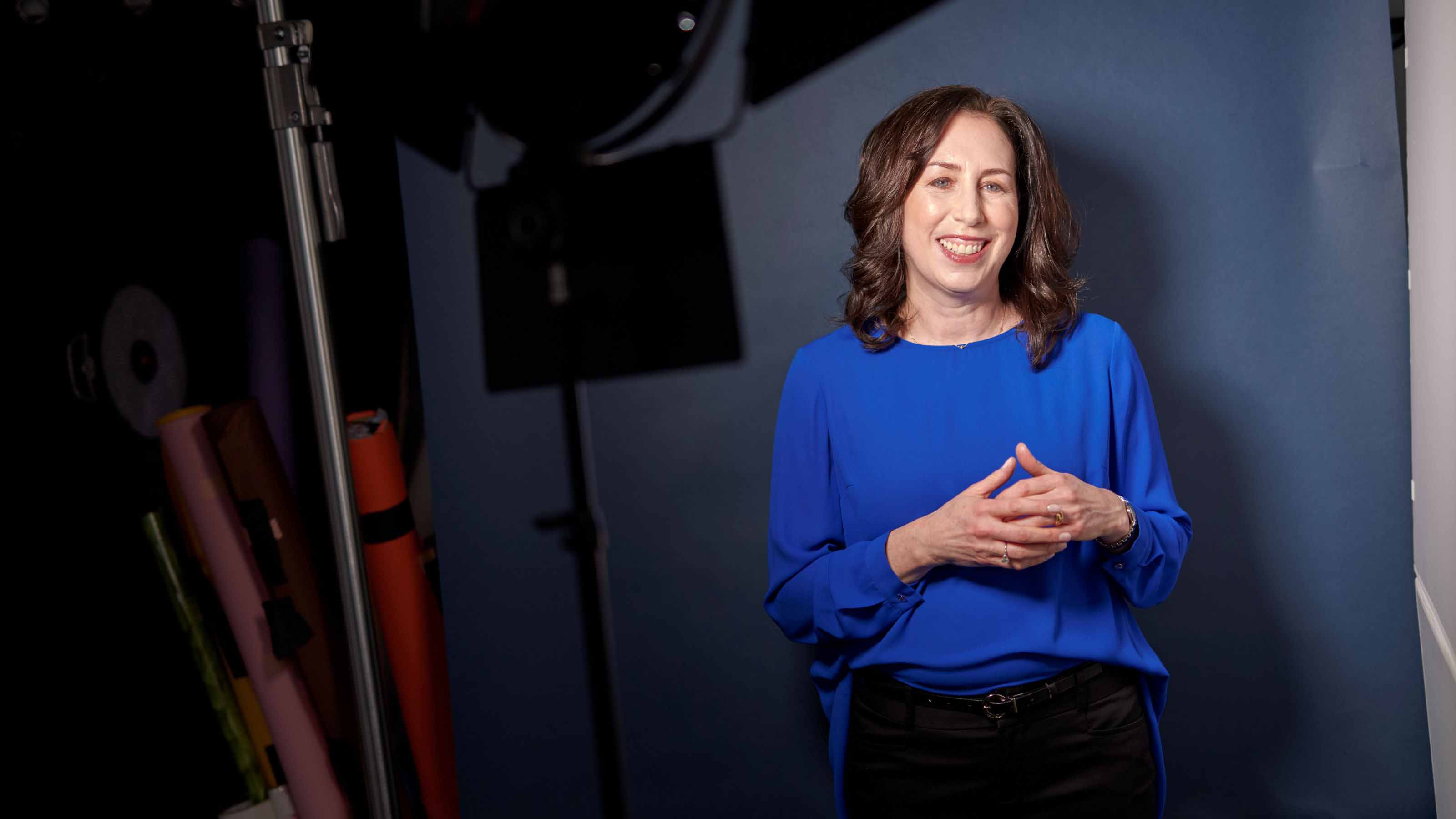Money-Smart Strategies for Charitable Giving
Schwab Charitable president Kim Laughton joins our hosts Ryan Ermey and Sandy Block to discuss why you should use a donor-advised fund for year-end charitable giving. Also, the duo offers tips on how to avoid ID theft and holiday scams.

Profit and prosper with the best of Kiplinger's advice on investing, taxes, retirement, personal finance and much more. Delivered daily. Enter your email in the box and click Sign Me Up.
You are now subscribed
Your newsletter sign-up was successful
Want to add more newsletters?

Delivered daily
Kiplinger Today
Profit and prosper with the best of Kiplinger's advice on investing, taxes, retirement, personal finance and much more delivered daily. Smart money moves start here.

Sent five days a week
Kiplinger A Step Ahead
Get practical help to make better financial decisions in your everyday life, from spending to savings on top deals.

Delivered daily
Kiplinger Closing Bell
Get today's biggest financial and investing headlines delivered to your inbox every day the U.S. stock market is open.

Sent twice a week
Kiplinger Adviser Intel
Financial pros across the country share best practices and fresh tactics to preserve and grow your wealth.

Delivered weekly
Kiplinger Tax Tips
Trim your federal and state tax bills with practical tax-planning and tax-cutting strategies.

Sent twice a week
Kiplinger Retirement Tips
Your twice-a-week guide to planning and enjoying a financially secure and richly rewarding retirement

Sent bimonthly.
Kiplinger Adviser Angle
Insights for advisers, wealth managers and other financial professionals.

Sent twice a week
Kiplinger Investing Weekly
Your twice-a-week roundup of promising stocks, funds, companies and industries you should consider, ones you should avoid, and why.

Sent weekly for six weeks
Kiplinger Invest for Retirement
Your step-by-step six-part series on how to invest for retirement, from devising a successful strategy to exactly which investments to choose.
Ryan Ermey: If you're giving to charity before the end of the year, you should consider a donor-advised fund. What's that? We're glad you asked because we brought on Schwab Charitable president Kim Laughton to tell you what they are and why you need one in our main segment. On today's show, Sandy and I tell you how to protect your identity over the holiday shopping season in a new Deal or No Deal segment featuring discussion of Costco samples and that awful Peloton hat. That's all ahead on this episode of Your Money's Worth. Stick around.
- Episode Length: 00:29:46
- Links and resources mentioned in this episode
- SUBSCRIBE: Apple Google Play Spotify Overcast RSS
Ryan Ermey: Welcome to Your Money's Worth. I'm Kiplinger's associate editor Ryan Ermey and I'm joined as always by senior editor Sandy Block. Sandy, how are you?
Sandy Block: I'm good.
From just $107.88 $24.99 for Kiplinger Personal Finance
Become a smarter, better informed investor. Subscribe from just $107.88 $24.99, plus get up to 4 Special Issues

Sign up for Kiplinger’s Free Newsletters
Profit and prosper with the best of expert advice on investing, taxes, retirement, personal finance and more - straight to your e-mail.
Profit and prosper with the best of expert advice - straight to your e-mail.
Ryan Ermey: You know, it is the holiday season Sandy. It's the holiday season.
Sandy Block: Andy Williams is in the house.
Ryan Ermey: I should start doing Bing Crosby, Andy Williams on the show. Everyone will love that. We wanted to remind everyone that the holiday season is a time that's rife with opportunities for scam artists and ID thieves. You're swiping your credit card a lot at the register. You're entering information on maybe new web sites where you're trying to find that perfect gift for somebody. So it behooves people to be extra careful this time of year.
Sandy Block: That's right. And fraudsters are counting on the fact that a lot of people are online buying things and that people are distracted and that they're busy. And because they're smart fraudsters, they keep adjusting their tricks and tools. And one thing, because it's become harder to create counterfeit credit cards, they've embedded malicious software in retail sites. So some of the tips that we want to talk about is one, we've mentioned it many times before and talking about ID theft. Use a credit card instead of a debit card. And that's number one. It's easier to get your money back, you can just...
Ryan Ermey: Far stronger consumer protection...
Sandy Block: You can refuse to pay anything. So use a credit card instead of a debit card. Monitor your transactions. That way you can catch somebody early if they have gotten your credit card and used it to buy something. Some gifts for someone that you don't know.
Ryan Ermey: Yeah...
Sandy Block: And another one that has come up a lot is when you, I noticed this when I go online. The web sites are always asking me, "Do you want to save your information?" You'll buy something and they say, "Do you want to save your credit card information?" Don't do it. Because that's where the malicious software comes into play. And they have infected some. It's not just shady retailers, they've infected some good ones too, some big ones. So don't let them save your information. Take the time just to plug it in every ... Type in your credit card every time you buy something. Don't let it sit there where somebody might come along and be able to steal it.
Ryan Ermey: Be on the lookout for some of the very common forms of fraud. Phishing is a big one. Your classic phishing with a "ph" folks. That's people, you might get an email saying, "Starbucks has a new peppermint mocha latte or whatever, click here." Make sure, you have to look at the email addresses on these things. Don't click on anything that looks suspicious. Which I believe that was actually the exact pitch that... we got like cybersecurity training here at Kiplinger and that was the exact pitch that they...
Sandy Block: It was like a free latte, yeah.
Ryan Ermey: ... like a fake peppermint mocha or whatever it is and some horrifying number of Kiplinger's bought it.
Sandy Block: Clicked on it, it's right.
Ryan Ermey: Clicked on it. People like their flavored coffees folks.
Sandy Block: Yeah. And they'll give up their ID for it. And the other thing to be on the lookout for in the phishing crews is that you'll get emails from maybe a retailer you've done business, or look like they come from Amazon or Walmart or Target. You've done business with them. You get an email saying, "Click on this link to track a package or something like that." And these guys are pretty good. So to avoid that, don't click on the link in the email, go back to the web site and click on it separately. And that way you're avoiding being lured into giving up some information to somebody you don't want to have it.
Ryan Ermey: And the last thing that I would contribute is that, especially if you're on a tight holiday budget, you may be looking for ways to find things for cheaper, right? So last year I was getting my nephew a football jersey and I was looking on the NFL site and it was quite expensive. So I'm thinking, "Oh, maybe I'll get him some replica Chinese knock off for quite a bit cheaper." But any time that you're going to... an off brand, let's call a web site like that, you're opening yourself up to a potential scam. So one thing is if you're buying a gift card from a discount site, it's very possible that they send you a gift card that has no value.
Ryan Ermey: And another is if you're going to buy something say on eBay or buy something directly from another person, make sure that you're using some kind of standard payment method. Any nonstandard form of payment is almost always a scam. If they're trying to ask you to do a wire transfer...
Sandy Block: Wire transfer to make a...
Ryan Ermey: ... anything crazy like that, run for the hills. Make sure that you're using a credit card, which as we said, comes with fraud protection. You can dispute unfamiliar charges. PayPal has pretty robust protections. So use payment methods that you trust. Don't ever wire anyone any money.
Sandy Block: And be skeptical about good deals, even if you're on Amazon. There's all kinds of stuff on Amazon now. It's just a huge marketplace. And if you see something particularly in the electronics area that's so much cheaper than it is at the Apple store or whatever, you really need to be suspicious about. And if this is not in a box, or something like that, you need to be really suspicious about what it is that you're getting. I mean again, the too good to be true thing really comes into play here when you're looking at cost.
Ryan Ermey: So there you have it folks. A couple of nuggets of advice there for protecting yourself over the holidays. We will put all of our wonderful material on this up in the show notes and if you guys go and click on it and read it, maybe, I can't make any promises but I'll try not to sing on the podcast. Did you know that you can save on capital gains by donating appreciated stock? Kim Laughton talks charitable giving after the break.
Ryan Ermey: We are back, and we are here with Kim Laughton, she's the president of Schwab Charitable and we're here talking about a tool that a lot of listeners might be interested in utilizing around this time of year when it comes to charitable giving. That's donor-advised funds. So Kim, thank you so much for coming on.
Kim Laughton: Thanks for having me.
Ryan Ermey: So I mean, let's get started with the very basic question. What is a donor-advised fund and why have they become more popular in recent years?
Kim Laughton: Well, donor-advised fund is just a specialized account for charitable giving. Much like an IRA or a 401(k) is a specialized account for retirement, or a 529 plan is a specialized account for college savings. Donor-advised funds allows philanthropically minded individuals, couples and families across a variety of wealth and age ranges to set aside money for charitable giving and to do so very tax effectively. It essentially allows you to establish an account by contributing cash or appreciated investments and assets such as publicly traded stocks or mutual funds.
Kim Laughton: When you make that contribution, you get a current year tax deduction. The funds can be invested for potential future growth and then they can be granted out to charities at your convenience over time. So they really just create a one stop shop for all your charitable giving in one place. It's easy to do, very simple, very flexible. And it also allows you, particularly at a place like Schwab and other financial services firms to be thinking about your charitable giving in the same place, and using the same web sites and the same tools as you use for financial planning and investing.
Sandy Block: So Kim, after the tax overhaul in late 2017 the percentage of people who deduct charitable contributions went way down. This is now about maybe 10% of people itemized. How has that affected the use of donor-advised funds? Have they become more popular because people can sort of bunch up contributions in one year and maybe itemize it? I'm curious what you've seen since that that bill was passed.
Kim Laughton: Yeah, no that's a great question. And I think it's a little too early to tell. I think many people didn't really understand how the tax law, even though it was implemented in 2018 they really didn't understand until this year when they filed their taxes in 2019 how they were impacted. So I think their behavior may not change for another year and now that they understand how they're impacted.
Kim Laughton: But certainly donor-advised funds, they first of all, they continue to make it really easy to give appreciated investments, which didn't change in the tax law, right? So when you give appreciated investments to charity, you don't have to pay capital gains tax on the sale of those investments. So you can effectively give 20% more if you have really highly appreciated investments. So that didn't change. We still see lots of people using donor-advised funds just because we make that process so simple.
Kim Laughton: But the second strategy that we are seeing people beginning to use as you referred to as bunching or we sometimes call concentrating their giving. And it's this idea that if you're close to being able to itemize, that it may make sense every few years to give a little bit more to a donor-advised fund. Be able to itemize your deductions in those years and get the full tax advantage of those gifts.
Kim Laughton: And then in the off years you take the standard deduction. So we have a white paper, but if you do the math you can effectively end up saving a lot in taxes and giving more, just by timing your gifts correctly. You may still give to the charities with the same pace, because you can set up recurring grants out of your donor-advised funds. But it allows you just to make sure that you're getting the full tax benefit of those gifts. And those who are taking the standard deduction really aren't getting the full tax benefit of their charitable gifts. So it's a really important strategy for people who are either taking the standard and are close to itemizing or just are curious to really think through that strategy.
Ryan Ermey: Yeah, I mean, and you mentioned something important there, which is timing and we've timed this episode to come out toward the end of the year. Why is this something that people should be considering looking into now?
Kim Laughton: Well, so the end of the year is always a busy time for giving, number one because it's the holiday season. People are between Thanksgiving and the holidays in December, in a giving mindset. But also the tax deadline to get that current year deduction is December 31st. So there are two things that tend to drive people's behavior. I'd say this year in particular we were having another strong year in the markets. And so people with appreciated investments, this is a good time to think about contributing them. Oftentimes they're working with their investment advisor or their CPA or their tax professional to really think about their tax situation.
Kim Laughton: Investment advisors oftentimes are rebalancing portfolios. If you've got highly appreciated securities, your equity portion of your portfolio may be a little bit higher than you want and it's a good time to be selling some of those. And rather than sell those securities, people oftentimes will instead contribute some of the shares to a charitable account. Because again, they don't have to pay the capital gains tax on the sale if they do that. So for all sorts of reasons, the end of the year ends up being really a good time to be thinking about this. And particularly this year with the markets close to their all time highs. Many people may have appreciated investments, which are very, very, very good thing to be giving.
Sandy Block: So, Kim, the other thing that happens around this time of year is that people sort of get inundated with charitable solicitations. I'm working on a story now about another charity rating organization. Because people do have such a hard time making decisions about who they want to benefit. Do you offer any tools or or any advice to people who maybe set up a donor-advised fund but would like some guidance about how to use that money?
Kim Laughton: Absolutely, and that's very common. Many people know where they want to give but many people do not. And certainly we see people wanting access to more resources. We offer our clients on our web site all sorts of resources for obviously for disaster relief. The Center for Disaster Philanthropy is a great resource. We also partner very closely with an organization at Stanford, the Stanford Center on Philanthropy and Civil Society with the Bill and Melinda Gates foundation on their give lists.
Kim Laughton: We also have access to Candid, formerly known as GuideStar, Charity Navigator, Charity Watch, GiveWell and Give.org are all really great ways to get some ideas and to really be able to sort through them. So it's a common question, but there are a lot of good resources out there to help people.
Ryan Ermey: And part of the beauty of a donor-advised fund is that you can make a charitable contribution by the end of the year deadline, but you don't have to decide right away how you're going to disperse that money. How do people sort of go about making those kinds of decisions?
Kim Laughton: It is a great feature and that it really helps to separate the tax decision from the giving decision.
Ryan Ermey: Right.
Kim Laughton: Especially that busy time of year when people have a lot of other things to be doing. So that's the real beauty. We see many people who will contribute at the end of the year, even during the year and grant out in the same year and then re-contribute the next year. So some people really do just use it as a one stop shop and almost like a charitable checkbook. And that's very common. We see others more often. Those that have large windfall events, maybe their company goes public or they sell their business or they get a big inheritance, they've got a big chunk of money that can perhaps fund multiple years of giving, maybe even a lifetime of giving and they'll put the money in and then give it out over time.
Kim Laughton: Our donors are very generous on average, they're giving out a high percentage of their assets every year. But yeah, and some give almost all their assets out and then re-contribute and others will give smaller amounts out just because they've had a big windfall. So there are all sorts of different use cases.
Kim Laughton: Our accounts are also available to clients with as little as $5,000 to open. So, and our largest accounts have over a billion. So we have... Appeals to a wide range of investors, everyday investors as well as those who are large philanthropists and are really have set up endowment funds for giving over their lifetimes and even into the next generation. They can pass their accounts on as well.
Sandy Block: Yeah Kim, it seems like one thing that donor-advised funds do is provide sort of this service to something that people used to have to set up foundations for, which can be pretty expensive. And you mentioned your minimum, but it sounds like you don't have to be really wealthy to take advantage of this tool?
Kim Laughton: No, you don't. I mean one of our objectives in establishing our offer, and we're celebrating our 20th anniversary this year. But Chuck Schwab, the founder of both Schwab and Schwab Charitable felt very strongly that we should give everyday investors access to charitable planning and giving tools. So we've always kept our minimums very low, just low enough for us to be able to sustain our operations. And over 90% of Americans give in some way shape or form. Many people don't consider themselves charitably inclined. But when you ask them if they've got children, if they support their children's schools or youth sports leagues. And oftentimes they don't realize that all of those are charities.
Kim Laughton: So most people are giving, if they are giving, it's just smart to be giving and keeping track of it in one place. You don't have to save all your receipts to give them to your tax professional to use on your taxes. And you can do everything in one place and just be able to have more impact, use appreciated securities.
Kim Laughton: Our average account size, our median account size is less than $25,000. Again, our minimums are 5,000 and so we appeal to really the every day investor and philanthropists that's interested in giving back tax effectively.
Ryan Ermey: Well there you have it folks. It is indeed the giving time of year. So if you are considering it, especially if you have a portfolio that has gone through the roof, like I'm sure all of your portfolios have. Consider a donor-advised fund and we'd like to thank Kim from Schwab Charitable. Thank you again so much for coming on.
Kim Laughton: Thanks so much for having me and happy holidays to both of you.
Ryan Ermey: Coming up. I'll tell you where to get a great deal on a spiral ham and Sandy will tell you why you should wait to buy the exercise equipment to work it off. Don't go anywhere.
Ryan Ermey: We're back and before we go, another edition of deal or no deal. Sandy, is yours a deal or a no deal?
Sandy Block: Mine is a no deal, and it's tied to what has sucked up hours and hours of productivity this week, which is everybody watching all of the mockery of the Peloton hat, which has definitely stolen away several hours of my life that I'll never get back.
Ryan Ermey: Do you care to recap it for anyone that hasn't seen it?
Sandy Block: Well okay, so this guy gives his super toned wife a Peloton bike for Christmas, and she gets on it and she looks like she's chased by wolves when she bikes on. She looks terrified and they show her spending a year on this bike and then, "Oh, and filming herself."
Ryan Ermey: Filming herself.
Sandy Block: And at the end she shows her husband her film and says, "I can't believe how this has changed me." The woman weighs like 90 pounds. Right?
Ryan Ermey: Well, and she also seems to be completely daunted by the idea of riding a stationary bike. It's this incredibly complicated and scary thing for her to do.
Sandy Block: She's going to get a grade or something or they're going to come through the video and say, "Grace from Boston, you do terrible." Yeah.
Ryan Ermey: Her husband's going to lock her up with his other wifes if she doesn't do well enough on the bike.
Sandy Block: Anyway. If you want to have some time to waste, the parodies are awesome, but alright. If you seriously do want to give someone exercise equipment for Christmas, and I have heard some defenses in this office of the Peloton bike, there's some people who love their Pelotons. If you want to give one, it is not a deal in December according to our friends at deal news. If you wait until January you can get substantial discounts on all kinds of exercise equipment.
Sandy Block: Exercise equipment is not a deal in December. Our advice is if you really want to give someone exercise equipment and don't think that she'll get a divorce, take a picture of it and then go buy it in January and then you can use all that money that you've saved to buy memberships or cool exercise gear or whatever. The other things just to add that typically go on sale in January that you shouldn't buy in December are obviously holiday decorations. You can get 70% off in January. Winter clothes go on sale in January according to Dealnews and also bedding. So, if you want any of those things, they are not deals now. They will be deals soon. So what do you got Ryan?
Ryan Ermey: Well, I went for the... I've been to a Costco before, but for the first time ever I went. A few weeks ago when I had my big Halloween party I went to buy booze and pigs in a blanket and all that kind of stuff. And you know, it was the first time I had been during a time when they had all the people with all the samples out.
Sandy Block: You can get a meal.
Ryan Ermey: Oh my god. I mean, I just really can't believe how well oiled a machine that business is. Anyway, we have a lot of readers of our web site who enjoy all of our Costco content and I think I'm becoming one of them, I'm converted. I have a buddy of mine who has a membership who drives me out there when he's in town. He is usually in town when I'm having parties where there's a lot of booze.
Ryan Ermey: But I'm considering getting a membership myself and there are a number of Kirkland brand items. And I believe a slideshow on the web site lists 17 such Kirkland products. Then Kirkland is the house brand at Costco...
Sandy Block: Right, there are good deals at Costco.
Ryan Ermey: That are especially good deals and holiday themed items. I am not going to read all 17 to you, because that would make this a very long podcast. But there are a couple of things that I thought were especially Christmas-y to me or holiday-ish that I thought were worth mentioning.
Ryan Ermey: One, and this is if you have kids or you at least have kids in your house. My nephew wakes me up before the sun is up practically to open those presents and Kirkland signature coffee is apparently quite an excellent deal. I'm usually not awake until all of the presents have already been opened. I practically open them in my sleep at this point. But it's cheap at Costco if you buy the Kirkland brand. We found a pack of 120 of the Kirkland Signature, Pacific Bold Organic Pacific Bold Dark-Roast Coffee at about 31 cents a pod.
Ryan Ermey: That beats even the Starbucks pods sold at Costco. It also beats the Wegmans brand pods. So only by a couple cents per pod if you will. But still a good deal. And then the bulk coffee, the whole bean coffee is an even better deal. Moving on to holiday dinner, spiral ham. Buy the whole spiral ham, $2,29 a pound for the Kirkland signature ham.
Sandy Block: Oh my gosh. You can get a lot of ham.
Ryan Ermey: Look, if you go to Wegmans, once again, you're going to pay 40 cents more per pound and on The Honey Baked Ham web site, and that's what it says in this slideshow, I wasn't aware that there was an official Honey Baked Ham web site.
Sandy Block: Oh, Honey Baked Ham is huge buddy.
Ryan Ermey: Well, an eight pound spiral ham, enough to feed the same amount of people. So 16 people, is going to cost you $79.95. The same thing at Costco, if we're doing the math here, $25.
Sandy Block: Oh my god, that's like a $50 difference.
Ryan Ermey: Yeah.
Sandy Block: You could buy twice as much ham.
Ryan Ermey: Yeah, as they buy three, it's...
Sandy Block: I can just feed the neighborhood.
Ryan Ermey: Yeah.
Sandy Block: That's a lot of ham...
Ryan Ermey: ... and wine, everyone knows is a cheap one.
Sandy Block: Wine is obviously a good deal at Costco.
Ryan Ermey: Tequila somehow didn't make the list here, which is one of my favorite holiday beverages.
Sandy Block: Shop around.
Ryan Ermey: Batteries.
Sandy Block: Oh, batteries.
Ryan Ermey: Quite a bit cheaper to buy those Kirkland signature AA alkaline batteries. Another one, if you had kids, everything that they open up practically...
Sandy Block: Need a battery.
Ryan Ermey: ... needs batteries. The Kirkland Signature tenderloin filet mignons. You have a Christmas dinner, $16.99 a pound. Wegmans selling Angus Tenderloin steaks for $33 a pound.
Sandy Block: Oh my gosh.
Ryan Ermey: So once again, coming out well ahead. Cheese Flights, I mean who doesn't like a holiday Cheese Flight? The Kirkland Signature Cheese Flights going much cheaper than you'd get at your local cheesemonger. And finally, and I mean not finally, go online...
Sandy Block: There's a bunch more of it.
Ryan Ermey: ... and read the whole thing. But the Kirkland Signature Whole Smoked Turkey, $2.29 a pound. A steel we say on this slideshow, considering all you need to do is heat and serve. No thawing, no brining, no deep frying. Although buddy of mine did that exactly.
Sandy Block: No burning down the house.
Ryan Ermey: Yeah, exactly. The smoke turkeys that our Intrepid researchers sell in the Costco core case were averaging around $25 a piece, enough to feed a table full of hungry relatives. And that is cheap boy.
Sandy Block: Right, right. I mean, the thing about Costco is you got to go in with a list, because otherwise you'll end up spending twice as much as you intended and not everything there is a deal. But these are great deals. So if you go in with a list and you read our slide show and you know where the deals are, you can do really well.
Ryan Ermey: And fill up on samples and cheap hot dogs. So be on the lookout for the excellent Christmas and holiday deals and you could even get a meal out of it as I'm shopping.
Sandy Block: While you're there.
Ryan Ermey: That'll do it for this episode of Your Money's Worth. For show notes and more great Kiplinger content on the topics we discussed on today's show, visit Kiplinger.com/links/podcasts. You can stay connected with us on Twitter, Facebook or by emailing us at podcast@kiplinger.com. If you liked the show, please remember to rate, review and subscribe to Your Money's worth wherever you get your podcasts. Thanks for listening.
Links and resources mentioned in this episode
- ID Theft: Act Now to Protect Yourself
- 6 Scams to Watch Out for This Holiday Season
- 7 Smart Moves to Avoid Identity Theft
- 7 Smart Moves to Avoid Identity Theft
- 5 Charitable Planning Options That Can Save You Money on Taxes
- Give the Money, Keep the Tax Break With Donor-Advised Funds
- 17 Best Kirkland Products for the Holidays
Profit and prosper with the best of Kiplinger's advice on investing, taxes, retirement, personal finance and much more. Delivered daily. Enter your email in the box and click Sign Me Up.

Block joined Kiplinger in June 2012 from USA Today, where she was a reporter and personal finance columnist for more than 15 years. Prior to that, she worked for the Akron Beacon-Journal and Dow Jones Newswires. In 1993, she was a Knight-Bagehot fellow in economics and business journalism at the Columbia University Graduate School of Journalism. She has a BA in communications from Bethany College in Bethany, W.Va.
-
 Dow Loses 821 Points to Open Nvidia Week: Stock Market Today
Dow Loses 821 Points to Open Nvidia Week: Stock Market TodayU.S. stock market indexes reflect global uncertainty about artificial intelligence and Trump administration trade policy.
-
 Nvidia Earnings: Live Updates and Commentary February 2026
Nvidia Earnings: Live Updates and Commentary February 2026Nvidia's earnings event is just days away and Wall Street's attention is zeroed in on the AI bellwether's fourth-quarter results.
-
 I Thought My Retirement Was Set — Until I Answered These 3 Questions
I Thought My Retirement Was Set — Until I Answered These 3 QuestionsI'm a retirement writer. Three deceptively simple questions helped me focus my retirement and life priorities.
-
 PODCAST: Tax Breaks for College Finance with Kalman Chany
PODCAST: Tax Breaks for College Finance with Kalman ChanyPaying for College Paying for (ever-pricier) college is a challenge that this consultant meets head on with highly specific guidance.
-
 PODCAST: Car-Buying in an Inflated Market with Jenni Newman
PODCAST: Car-Buying in an Inflated Market with Jenni NewmanBuying & Leasing a Car With cars both scarce and expensive these days, what to do if you want – or need – a new ride? Car-buying strategist Jenni Newman of Cars.com shares some tips. Also, more on the magical 9% savings bond.
-
 PODCAST: How to Find a Job After Graduation, with Beth Hendler-Grunt
PODCAST: How to Find a Job After Graduation, with Beth Hendler-GruntStarting Out: New Grads and Young Professionals Today’s successful job applicants need to know how to ace the virtual interview and be prepared to do good old-fashioned research and networking. Also, gas prices are high, but try a little global perspective.
-
 PODCAST: Is a Recession Coming?
PODCAST: Is a Recession Coming?Smart Buying With a lot of recession talk out there, we might just talk ourselves into one. We take that risk with Jim Patterson of The Kiplinger Letter. Also, dollar stores: deal or no deal?
-
 PODCAST: This Couple Tackles Love and Money as a Team
PODCAST: This Couple Tackles Love and Money as a TeamGetting Married Fyooz Financial, the husband and wife team of Dan and Natalie Slagle, have carved out a niche advising other couples with the money questions that come with pairing up. Also, where is this troubled stock market headed?
-
 PODCAST: Which Documents to Keep, Which to Shred and Which to Scan
PODCAST: Which Documents to Keep, Which to Shred and Which to Scanhome insurance A speedy recovery from disaster can depend on your recordkeeping. Kiplinger’s Personal Finance writer Rivan Stinson tells us how to get our papers in order.
-
 PODCAST: Decoding ESG Investing with Ellen Kennedy
PODCAST: Decoding ESG Investing with Ellen KennedyBecoming an Investor Environmental, social and governance investing is simpler than it sounds, and has a profitable track record to boot.
-
 PODCAST: High Gas Prices with The Kiplinger Letter’s Jim Patterson
PODCAST: High Gas Prices with The Kiplinger Letter’s Jim Pattersoncars Why are we paying so much more at the pump? How long will it last? What can you do? Plus: Congress is making changes to retirement-savings rules again.

